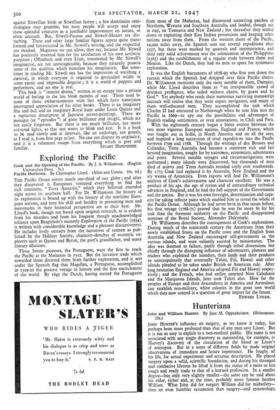Exploring the Pacific
Cook and the Opening of the Pacific. By J. A. Williamson. (English Universities Press. 5s.) Pacific Horizons. By Christopher Lloyd. (Allen and Unwin. 10s. 6d.)
THE Pacific Ocean covers nearly one-third of our globe ; and after they discovered it Europeans ventured everything to find the rich continent, " Terra Australis," which they believed extended right across its southern half. For Dr. Williamson the history of its exploration is bound up with the history of the maritime Euro- pean nations, and here his skill and lucidity in presenting men and movements in their historical perspective are at their best. Mr. Lloyd's book, though not based upon original research, as is evident from his mistakes and from his frequent though unacknowledged reliance upon Beaglehole's masterly Exploration of the Pacific (1934), is written with considerable knowledge and a pleasant discursiveness. He includes lively extracts from the narratives of seamen as pub- lished by the Hakluyt Society, character-sketches of eccentric ex- plorers such as Quiros and Byron, the poet's grandfather, and many literary allusions.
Those heroic pioneers, the Portuguese, were the first to reach the Pacific at the Moluccas in 1512. But the lucrative trade which rewarded them diverted them from further exploration, and it was under the Spanish flag that Magellan, a Portuguese, accomplished in 1519-21 the greatest voyage in history and the first encirclement of the world. By 1645 the Dutch, having ousted the Portuguese from most of the Moluccas, had discovered uninviting patches of Northern, Western and Southern Australia, and landed, though not to stay, on Tasmania and New Zealand ; but thereafter they settled down to exploiting their East Indian possessions and keeping other nations away from them. From the western shore of the Pacific, topoo miles away, the Spanish sent out several expeditions after 1527, but these were marked by quarrels and incompetence, and their only solid achievement was the colonisation of the Philippines (1565) and the establishment of a regular trade between them and Mexico. Like the Dutch, they had no men to spare for systematic exploration.
It was the English buccaneers of 1678-95 who first tore down the curtain which the Spanish had dropped over their Pacific shores. Dr. Williamson mentions only the most notable of them, Dampier, while Mr. Lloyd describes them as " an irresponsible crowd of drunken profligates, who sailed without charts, by guess and by God." Yet anybody who reads their numerous surviving manuscript journals will realise that they were expert navigators, and many of them well-educated men. They accomplished the task which Charles II had entrusted to Narborough when he sent him into the Pacific in 1669—to spy out the possibilities and advantages of English trading settlements, or even annexations, in Chili and Peru. With the eighteenth century began a bitter contest between the two most vigorous European nations, England and France, which was fought out in India, in North America and on all the seas, and inspired a long succession of rival expeditions into the Pacific between 1709 and 1768. Through the writings of des Brasses and Callander, Terra Australis had become a continent rich and fair beyond imagination, sought for by statesmen, economists, adventurers and poets. Several notable voyages and circumnavigations were performed ; many islands were discovered, but thousands of men died of scurvy and Terra Australis receded coyly ever southwards. By 1773 Cook had replaced it by Australia, New Zealand and the icy wastes of Antarctica. Even experts will find Dr. Williamson's analysis of Cook's achievements and character excellent. He was a product of his age, the age of reason and of extraordinary technical advances in England, and he had ,the full support of the Government and the nation. But it was his own foresight, determination and capa- city for taking infinite pains which enabled him •to reveal the whole of the Pacific Ocean. Although he had never been in that ocean before, his first voyage (1768-71) proved that he was far more fit for his task than the foremost authority on the Pacific and disappointed nominee of the Royal Society, Alexander Dalrymple.
Dr. Williamson describes the consequences of Cook's explorations. During much of the nineteenth century the Americans from their newly established States on the Pacific coast and the English from Australia and New Zealand encouraged self-government in the various islands, and were valiantly assisted by missionaries. The idea was doomed to failure, partly through tribal dissensions but chiefly through the disrupting influence of adventurers, planters and traders who exploited the islanders, their lands and their products so unscrupulously that eventually Tahiti, Fiji, Hawaii and other islands pleaded to be taken under British or American rule. After long hesitation F.nglaqui and America adopted Fiji and Hawaii respec- tively ; and the French, who had earlier annexed New Caledonia and the Marquesas Islands, later took Tahiti also. How far the peoples of Europe and their descendants in America and Australasia can establish non-military, white colonies in the great new world which they now control is a question of great import for the future.
EDWARD LYNAM.


































 Previous page
Previous page